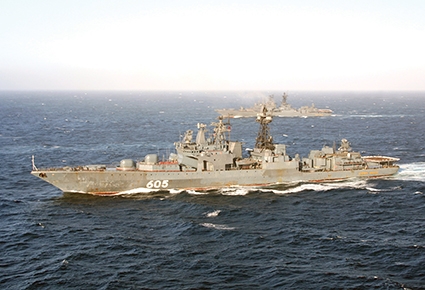Russian Navy Faces Century-Old Dilemmas
The recent incident in the Kerch Strait between Russian and Ukrainian war ships showed how important the Azov Sea is to the Russians. The reasons for the Russian moves to constrain Ukrainian passage range from tactical, such as countermeasures to what Ukraine does in Church affairs, to strategic: control over the Azov and securing the Don river basin against potential western military deployment.
In other words, securing its seas and rivers continues to be an important issue in the Russian geopolitical thinking. In the imperial and Soviet periods, Russia faced a problem when it was effectively cut off from ocean-faring. Although it was possible for the Russians to reach the world’s oceans through the Baltic and the Black seas, this was often hindered as sea empires such as Great Britain in the 19th century and the US in the 20th possessed larger naval capabilities than the Russians and could prevent Russian moves. This constrained Russian naval activity to the Black, Baltic and Caspian seas only.
Economic weaknesses as well as a lack of drive to invent made the Russian fleet incapable of carrying out large expeditions overseas. To succeed, the Russians had to have a green light from the sea powers for logistical support and unhindered progress. This happened very rarely.
Keeping a militarily capable naval fleet was beyond possible due to the fact that the Russians, both in the imperial and the Soviet times, required large economic expenses to do so. The State could not provide enough resources as Russia’s borders stretched thousands of kilometers and it was essential instead to spend money on field armies to hold back the Europeans, Turks, Iranians and Japanese and Chinese.
But there was also a geographic factor which played largely to the Russians’ disadvantage. Throughout the centuries Russia kept three naval fleets in the Black and Baltic waters as well as in the Sea of Japan/East Sea. But a look at the map shows how far are the seas are from each other, which precluded the Russians amassing their fleets in one theater of military action.
When the Russo-Japanese war broke out in 1904, the Russians, to help their fleet in the Sea of Japan/East Sea, had to move their fleet from the Baltic ports all the way from the Atlantic, circumventing Africa (as the British would not allow them to use Gibraltar or the Suez Canal) to Japan. Unsurprisingly, the Russians were already late by the time they reached the war.
In a sense, the Russian Federation nowadays has the same problems. The Soviet Union collapsed, but Moscow managed to keep the perimeter of its Soviet military bases in the Baltics, Black Sea and near Japan. Annexation of the Crimean Peninsula adds strength to the Russian naval capabilities, but it does not change it spectacularly. The same set of geopolitical problems still haunt the Russians. In the Baltic and Black Seas, the Russian fleet might be strong, but they do not allow for extended overseas operations.
Again, it all comes down to the unavailability of large funds for modernizing the Russian fleet and to a Russian emphasis put on the modernization of field armies necessary to defend the country’s extended borders on the European (against NATO expansion), South Caucasian and Middle Eastern fronts.
Nowadays too, as in the past two centuries, the Russians depend on the Bosporus and the Dardanelles straits, which, despite good Russo-Turkish relations, are in NATO member – Turkey’s possession. Having unhindered access to the Mediterranean Sea requires keeping good relations with Turkey, especially at a time when Russia has been carrying out military operations in and around Syria. This would largely explain why the Russians did not oppose diffusing disagreements with Ankara (following 2015 shoot-down of a Russian military jet by the Turks) in 2016 – Moscow needed access to the Mediterranean Sea.
Still, Moscow faces the same dilemma as the Romanovs or the Soviets had. Because of large distance between the Black, Baltic and the Japanese seas, it is nearly impossible for the Russians to concentrate their fleets quickly and efficiently in one war theater.
Putting the Kerch Strait problem between Ukraine and Russian into the above perspective, one can see that the Russians’ behavior is explained by a need to secure the Azov Sea from a potential foreign presence there. For Moscow, Ukraine is now a base for Western expansion, thence a foreign fleet in the Azov waters is, if not technically, then potentially a possible scenario.












